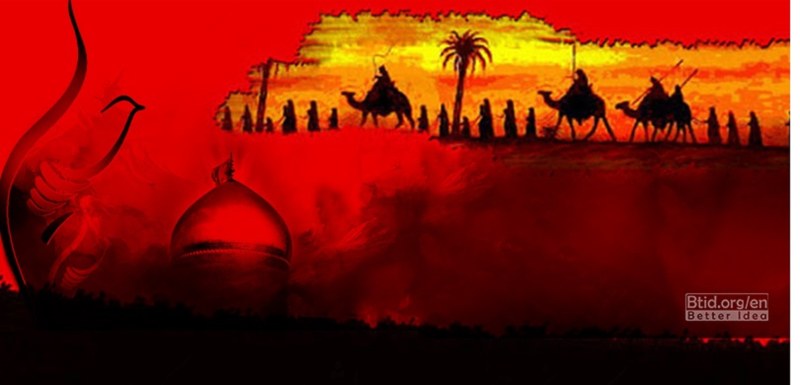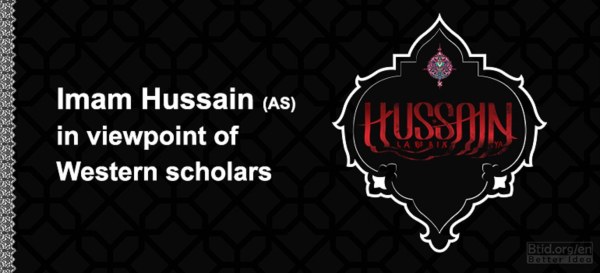-

Imam Hussain's personality and character
Imam Hussain (AS) according to Chris Hewer's viewpoint has a great personality and character. he says: I think the first thing that we have to begin with is: who is Hussain? The Hussain is the grandson of his grandfather the prophet of Islam and we have all sorts of little vignettes of the Prophet with his two grandsons the way that he would play with them, the way that he wanted them always to be near him, the way that he would even on one occasion allow them to ride on his back during prayers so that we see that particular closeness and intimacy now even though Imam Hussain is only a fairly young boy at the time of his grandfather's death. He is growing up in the household of the two people who were closest to the prophet. His daughter and her husband Imam Ali the first Muslim one who is the constant companion and so all the time as he's growing up, we can see him imbibing the spirit of Islam, not just the actual practice.

Secondly, if we go to that period after the death of Imam Ali when his brother Hassan takes the responsibility of being the spiritual guide of the community and enters into the pact with Muawiya. That is the context in which Imam Hussain becomes the Imam. And he follows through and owners the contract the Pledge the agreement of his brother. It's not him who breaks it. Therefore, we see a man of deep integrity and of respect for the one who went before.
Thirdly, when the Pact is broken, when Yazid is appointed, it is crystal clear from that moment onwards that there will be confrontation, because Hussein could not possibly make the oath of allegiance to Yazid. Because Yazid lives in open Defiance of the Sharia. He makes new perchance of Muslim living. How could somebody of Imam Hussain's position given out of allegiance to him? And so, we see someone who sees his Destiny unfolding in front of him. And he goes forward to meet his destiny as I think of it with his eyes wide open. He knows what's going on.
We see also in Imam Hussain deep compassion, deep compassion for those who are with him. And for those who are his enemies, so for his enemies first, we see the incident in which Al-Hor and his men have been shadowing them through the desert, both the companions of Hussain and also Al-Hor and his men have been many days in the desert that Dusty that dirty that dry, water is the most precious thing in this situation and when Al-Hor and his men ride into the camp of Imam Hussain, he shares his water supply with them, water both for the men and for the horses so that deep compassion that deep spiritual feeling for the other.
There is an important lesson that humankind has to learn. We overcome evil by the excessive use of good. Fighting is not going to provide peace in the world and Imam Hussain typifies that message when he reaches out to his enemy in this way.
We see his deep compassion in particular in those last days at Karbala in which he is asking giving permission to his companions to leave. It's me they want. You go. Save yourselves in which we see him with a child Ali Askar in his arms, pleading with the Umayyads for water for the baby. So that deep human compassion must reach out and touch any human being we see him as well-being steadfast in the face of the invitation from the enemy. If only you will agree, then we will save you it is a huge Temptation for every human being to save yourself.
We see the Temptations of Abraham and Ishmael and we know this human temptation runs all the way through human history. We can see as well a balanced sense of proportion you see when he is invited to go to Kufa by the people there he knows what kind of people they are? They with people who sometimes supported his father and sometimes they didn't. And so, his balance sense of judgment says I should send an emissary I should send Muslim bin Aqil. You go and find out what these people are really about and then come back and report to me. So, he is not a blue-eyed leader who thinks that all human beings always perfect. He knows the reality of the human condition as well.
We see him taking that awesome responsibility which must be the most terrible responsibility for any father and any head of household. He takes his family with him into the desert of Karbala. We know that when he is still in Medina people came to him and said: leave your family here, they will be safe. And he says: "and if I'm not there to protect them, who is says they'll be safe. Do you think that the Umayyads will respect them? No, they come with me. But they come with me into for me a certain future. I go to my death what will happen to my family? This I have to leave in the hands of God."
That character of being a father, of being the head of a household is a very important one. We see Hussain as well on the field of battle on Ashura itself, when he has to strengthen the man and give them permission to go into the field of battle now when you are doing battle against the Umayyad army; there is no question of how this is going to end up. It is going to end with your death. So, he is giving permission to people to go and die for the cause of Truth, because of their obedience to God and because of their love for the prophet and for his grandson Imam Hussain.
For any general knows that putting a man into the field of battle is the hardest decision that you ever have to make. And here we see Imam Hussain making that decision again and again. And finally, we see him with the women of his household, with the women of the tents. We see their enormous courage. They are the ones who dress their men folk in battle armor. They are the ones who receive back the bodies. Imam Hussain is going constantly to them bringing them Comfort bringing them that sense of inner peace that can only come when one knows that one is doing the will of God.
The first thing that we have to say about the story of Karbala or Christian and Muslim relations, in general, is that we are to Faith communities before God, and so anything that happens within either Community, is part of that relationship with God, is a rich seam of meaning for the people of other community. Therefore, we are constantly learning about God. We are unpacking the divine-human relationship.
Secondly, we realize that sacrifice is a critical part of the relationship between human beings and God. Because sacrifice means: I knowledge God's sovereignty over my life. My life does not belong to me.
We have the verses in the Quran when Prophet Abraham goes to Esmail and says: God has told me to sacrifice you and his answer should be the answer of every believer. If this be the will of God, then you will find in me an obedient servant. And that Spirit of sacrifice can only grow out of a deep commitment to faith, which is at the heart of both Christian and Muslim traditions.
Justice, we see through the life of the Prophet himself. He is giving his life constantly as a warner, as a servant, as a companion, and as a guide to the people. So, we see that in a dramatic way in the life of Imam Hussain, but we see that in the life of the other Imams and of many people than throughout human history.
Martyrdom is the one who gives their life fully into the hands of God. In the Christian tradition also, we have huge respect for the martyr, because the martyr is one who takes a stand on truth and Justice and uprightness before God and will not give way to the forces of evil. This is mottled in the Christian tradition on the life of Jesus. Jesus is the one who also is prepared to make the ultimate sacrifice of his life, in obedience to the divine will and therefore to lay down his life for others. And so, we can see so many reverberations between the stories of Hussain and the story of Jesus. There are differences as well as similarities. And these differences are not things that we should run away from because they serve as a very powerful reminder to us. We are not God, we cannot resolve these differences, and God can do that. And on the day of judgment, God will make clear those things that we could not understand. So, we can see similarities and differences within this tradition.
God calls human beings into a life which is a life stepping constantly into the unknown. Every time we walk through a door. Every time we answer the telephone. There is an invitation to an unknown experience, to an unknown encounter. That unknown encounter on a day-to-day basis is the same encounter that we see in the life of Jesus and Imam Hussain. They trust that God will vindicate them. They trust that what appears on the surface to be a catastrophe is a disastrous end. In fact, in the hands of God can become an event of such enormous importance in world history that he is lifted out of time and becomes as it were metahistorical above history itself, and in this way, we can see that these are events that rise above ordinary human experience and yet we are called to emulate them until they buy them too."



